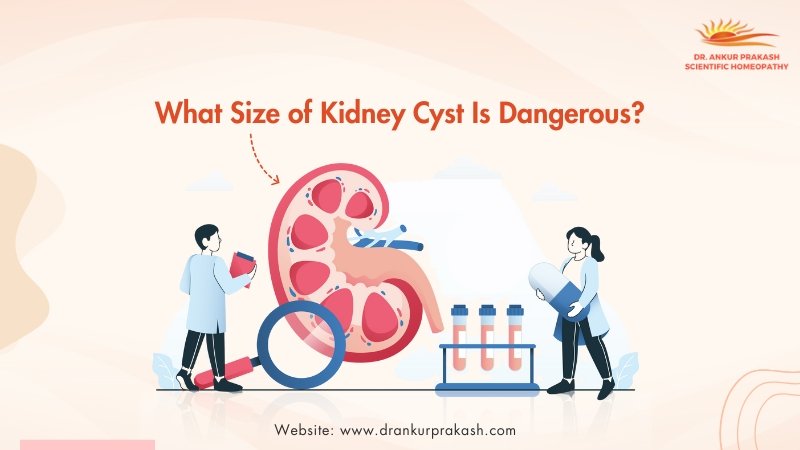Kidney cysts are fluid-filled sacs that form in or on the kidneys. While most cysts are harmless and noncancerous, their size plays a crucial role in determining potential health risks. Small cysts under 5 cm usually don’t cause problems and are often found incidentally during imaging tests. However, larger cysts—especially those over 5–7 cm—can lead to complications such as pain, infection, bleeding, or even pressure on surrounding organs.
In some cases, untreated or multiple large cysts can interfere with kidney function, potentially leading to the signs of kidney failure, such as fatigue, swelling, reduced urine output, or high blood pressure. Regular monitoring and timely medical intervention are essential to prevent such outcomes. Treatment options, including homeopathy and conventional methods, aim to manage symptoms and protect kidney health.
What is a Kidney Cyst?
A kidney cyst is a round or oval sac filled with fluid that forms either on the surface or inside the kidney. These cysts can vary in size—from a few millimeters to several centimeters—and may be discovered incidentally during imaging tests like ultrasound, CT scan, or MRI done for other health reasons. These cysts can be:
- Simple Cysts: These are benign, round sacs with a thin wall and filled with clear fluid. They rarely interfere with kidney function and are often discovered accidentally during imaging tests.
- Complex Cysts: These have thicker walls, irregular shape, or internal debris, and may contain septations (dividing walls) or calcifications. These require close monitoring, as there is a slight risk of malignancy (cancer).
Because of these features, complex cysts are classified using the Bosniak classification system, which helps determine their risk of becoming cancerous and guides follow-up or treatment plans.
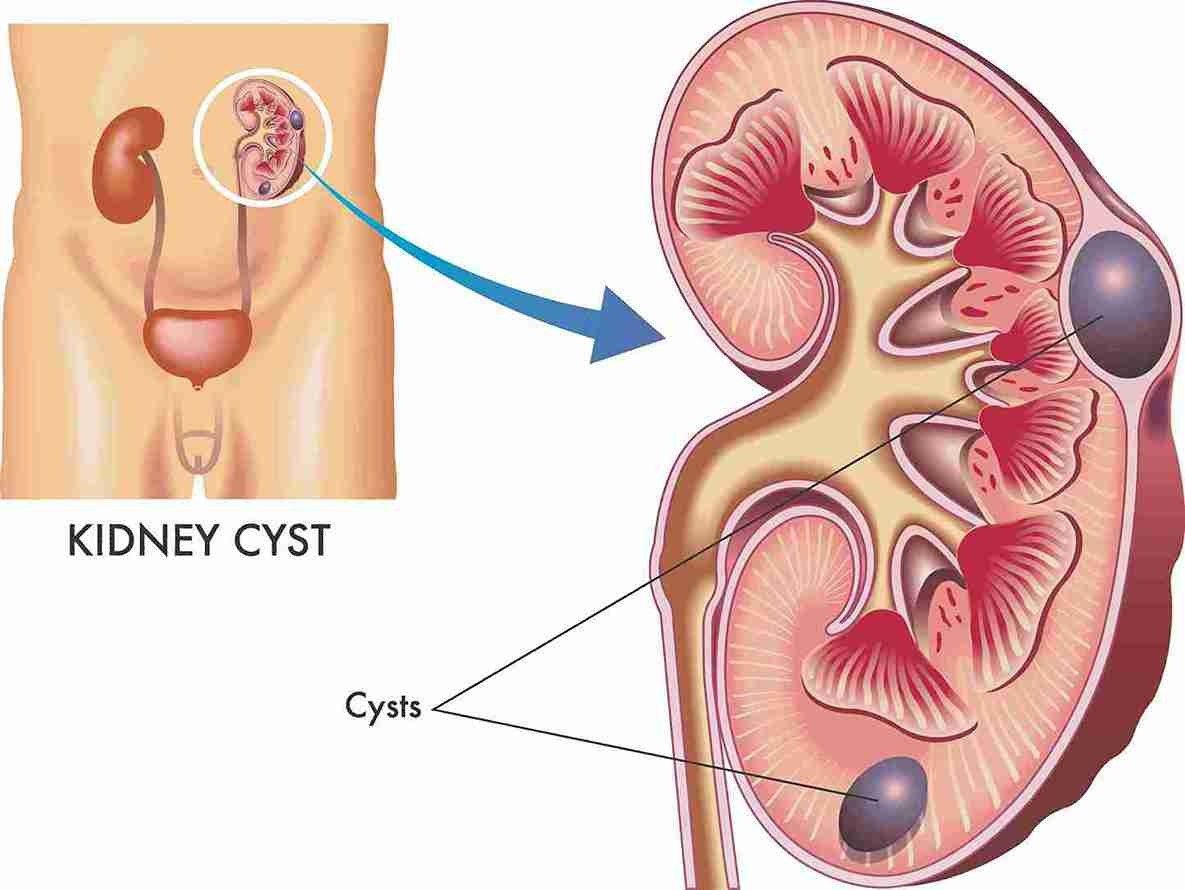
Symptoms of Kidney Cyst
Many people with small, simple kidney cysts experience no symptoms at all. However, as the cyst grows in size—particularly beyond 5 cm—it may begin to exert pressure on surrounding tissues or block the flow of urine, leading to symptoms such as:
- Persistent Back, Side, or Flank Pain:
One of the most common symptoms, this pain is usually dull and localized on the side of the body where the cyst is present. It may worsen with movement or pressure and is caused by the cyst stretching the kidney tissue or pressing on nearby nerves or muscles. - Upper Abdominal Pain or Heaviness:
As the cyst enlarges, it can create a feeling of fullness, bloating, or heaviness in the upper abdomen. This discomfort may interfere with daily activities and sleep. - Increased Frequency of Urination:
The cyst may press on the bladder or ureters, irritating the urinary tract and causing the need to urinate more often, especially at night (nocturia). - Burning or Difficulty During Urination:
If the cyst affects urinary flow or causes secondary infection, it may lead to painful urination or a sensation of incomplete bladder emptying. - Blood in the Urine (Hematuria):
When a cyst ruptures or bleeds, it can cause blood to appear in the urine. This may be visible as pink, red, or cola-colored urine, or detected microscopically in lab tests. - High Blood Pressure (Hypertension):
Large or multiple cysts can impair normal kidney function, which plays a vital role in regulating blood pressure. As a result, some people may develop or worsen existing hypertension, which is often resistant to medication unless the cyst is treated. - Fever and Chills – If the Cyst Becomes Infected:
Infected kidney cysts can trigger systemic symptoms such as high fever, chills, and shivering. This is a medical emergency that requires immediate treatment to prevent the spread of infection. - Nausea, Vomiting, or General Fatigue:
These are non-specific symptoms but can occur if kidney function is mildly impaired or if the cyst is causing constant pain or discomfort.
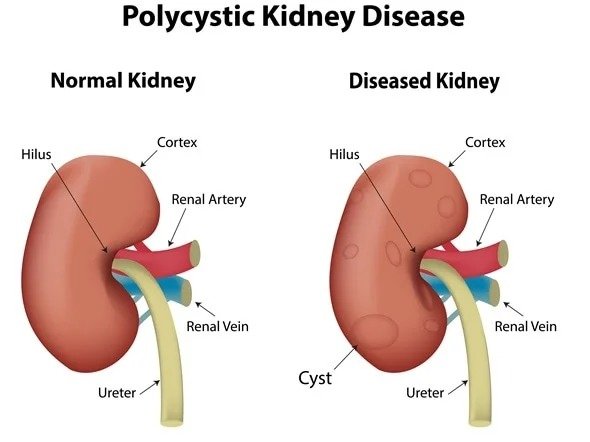
When is it dangerous?
Cysts that exceed 5 cm in diameter, grow rapidly, show signs of internal bleeding, rupture, or become infected are considered potentially dangerous and must be addressed promptly.
Causes of Kidney Cysts
While the precise cause of kidney cysts remains unclear in many cases, several risk factors have been identified:
- Aging: The likelihood of developing kidney cysts increases with age. By age 50, nearly 50% of people may have at least one simple kidney cyst.
- Genetic Disorders: Conditions like Autosomal Dominant Polycystic Kidney Disease (ADPKD) lead to the formation of multiple cysts and can cause kidney enlargement, high blood pressure, and kidney failure.
- Blockages in Kidney Tubules: When microscopic tubules become blocked, fluid can build up and form cysts.
- Chronic Kidney Diseases: Long-term kidney problems can alter the structure of the kidneys, increasing the risk of cyst formation.
- Metabolic Imbalance: Disturbed calcium, sodium, or hormone levels may also play a role.
- Infections or inflammation in the kidneys can trigger cyst formation in rare cases.
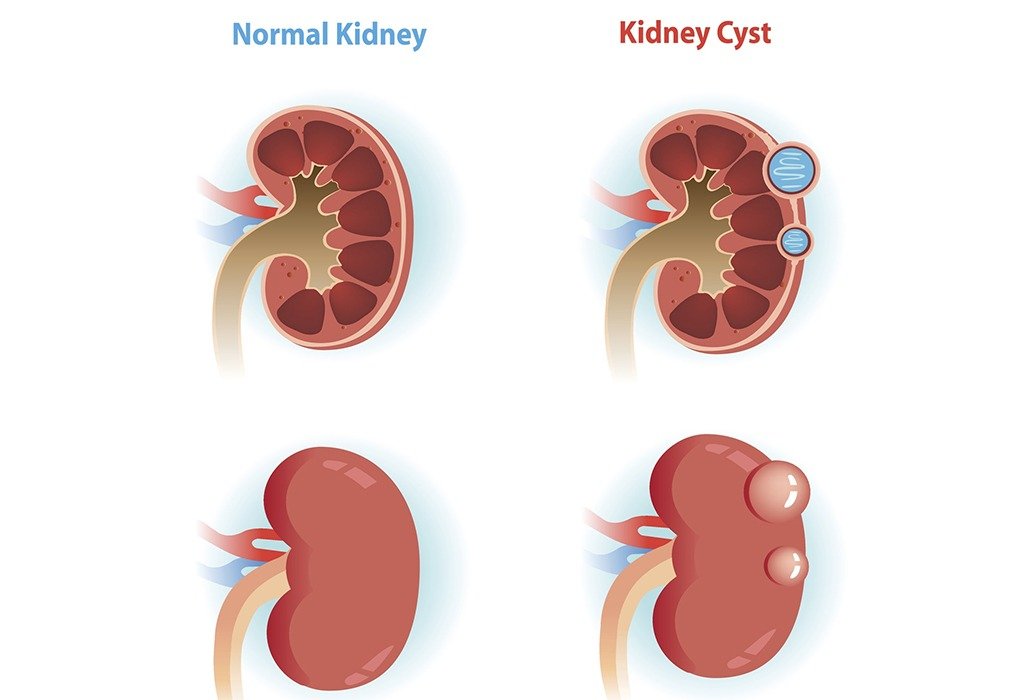
Homeopathy Treatment for Kidney Cysts
Homeopathy offers a gentle, safe, and holistic approach to the treatment of kidney cysts. Unlike conventional treatments that may focus on surgery or drainage in severe cases, homeopathy works by stimulating the body’s own healing ability to regulate abnormal growths and restore balance.
Some well-known remedies used in homeopathy for kidney cysts include:
- Berberis Vulgaris: Best suited for sharp, radiating pain in the kidney region, especially when accompanied by urinary discomfort.
- Lycopodium: Helpful in right-sided kidney issues, with bloating, constipation, and urinary issues.
- Apis Mellifica: Effective for swelling, inflammation, or burning sensations in the urinary tract.
- Terebinthina: For cases with hematuria (blood in urine), and offensive, scanty urination.
- Sarsaparilla: For kidney cysts associated with urinary tract infections and stones.
For best results, treatment should be guided by a qualified homeopathic physician like Dr. Ankur Prakash, who tailors remedies according to the patient’s constitution and cyst type.
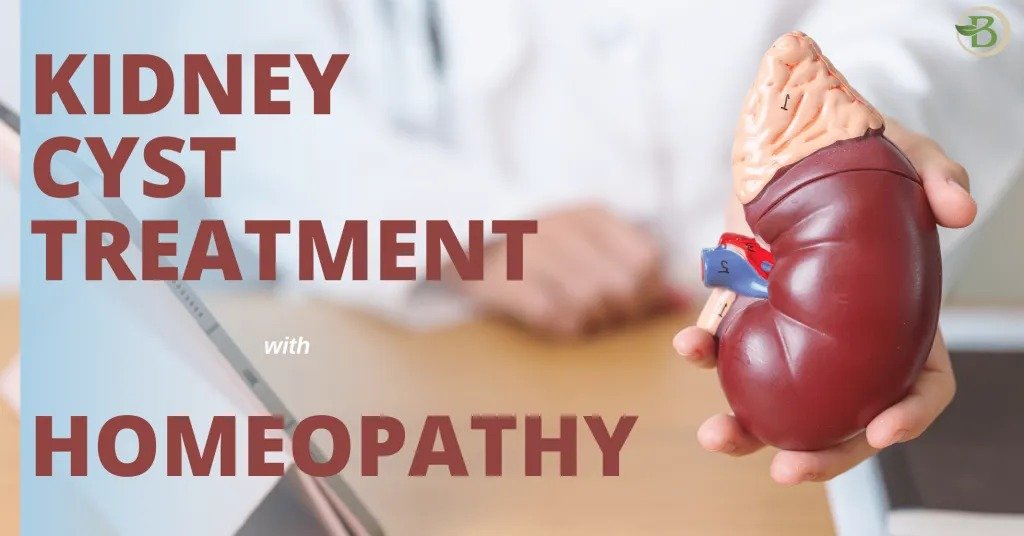
Can Kidney Cysts be Cured?
The possibility of curing kidney cysts depends on the type, size, and underlying cause:
- Simple cysts: Usually harmless and may remain stable without needing intervention. With homeopathic care, symptoms can be managed, and cyst progression may be slowed or stopped.
- Complex cysts: Require careful evaluation through imaging like CT or MRI scans. In certain cases, surgical drainage or removal might be needed if the cyst poses a cancer risk or causes serious obstruction.
While complete cure is not always guaranteed, homeopathy can provide long-term relief, slow the progression, and avoid surgical intervention in many cases.
Regular monitoring, a kidney-friendly lifestyle, and personalized homeopathic remedies work together to manage the condition effectively.
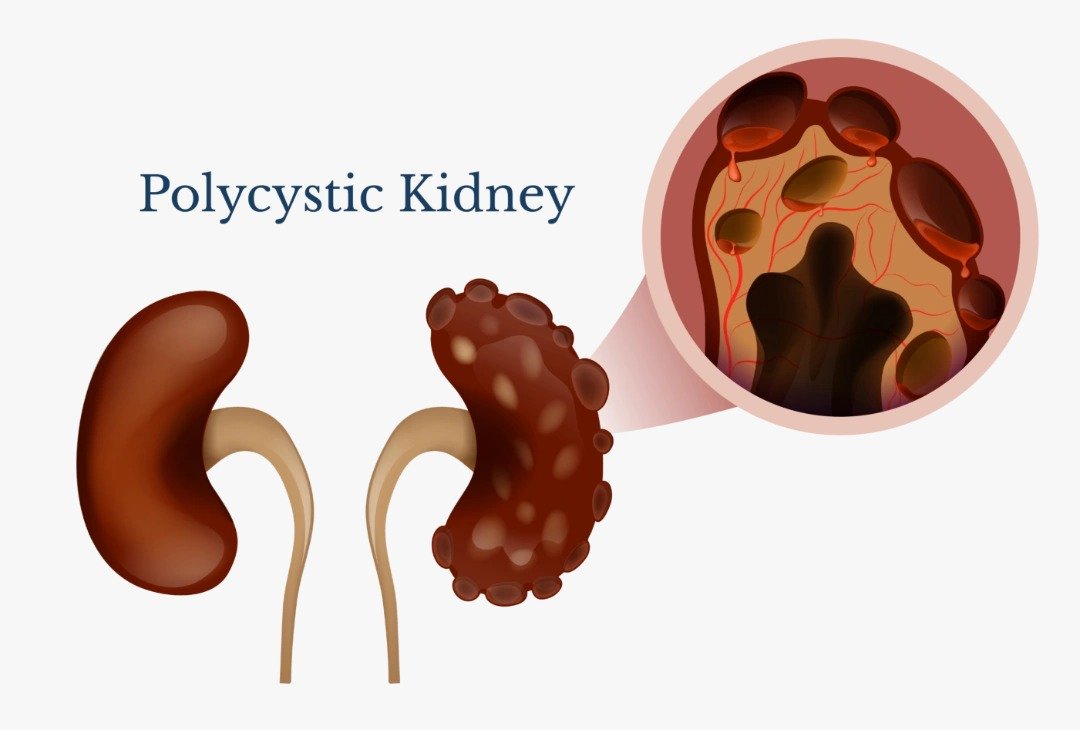
Are Kidney Cysts and Kidney Stones the Same?
No, kidney cysts and kidney stones are completely different conditions, even though both affect the kidneys. A kidney cyst is a fluid-filled sac that forms on or inside the kidney. It’s usually benign and caused by aging, genetic factors, or blockages. Most cysts are painless, but larger ones can lead to dull flank pain, high blood pressure, or infection.
On the other hand, a kidney stone is a hard deposit made of minerals like calcium or uric acid. Stones form when urine becomes too concentrated and can cause sharp, severe pain, blood in urine, nausea, or difficulty urinating.
Cysts are typically diagnosed through ultrasound or CT scans and may require observation or drainage if problematic. Stones are detected through imaging and treated with hydration, medications, or procedures like lithotripsy.
Understanding the difference is important, as they require very different treatments and management strategies.
Conclusion
Kidney cysts are often harmless, but their size and complexity determine how serious they can be. Cysts larger than 4–5 cm, especially if symptomatic or complex in nature, should be monitored carefully. Homeopathy offers a safe, effective, and non-invasive solution to manage kidney cysts, relieve symptoms, and avoid complications.
If you or a loved one has been diagnosed with a kidney cyst, consult Dr. Ankur Prakash for a personalized homeopathic approach that addresses the root cause and promotes lasting kidney health.

